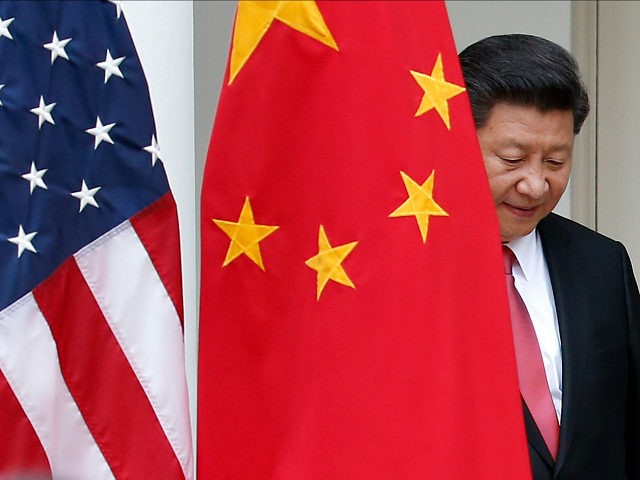A Chinese electronics company called Hikvision, partly owned by the Communist government, was one of several such firms banned from working for the U.S. government under the National Defense Authorization Act (NDAA) signed into law by President Trump on Monday.
Hikvision is reportedly assembling a powerhouse team of Washington lobbyists to fight back, a battle that pits the Chinese and American models of politicized economics against each other on America’s home turf.
The NDAA – formally named the 2019 John S. McCain National Defense Authorization Act after the late senator and chairman of the Senate Armed Services Committee – includes provisions intended to prevent the U.S. government from purchasing potentially vulnerable equipment from companies linked to the Chinese government.
The NDAA ultimately passed with much less stringent provisions than its authors originally envisioned, in part because the White House rescinded a high-profile ban on American companies doing business with Chinese telecom giant ZTE. Congress passed legislation blocking certain Chinese companies from selling surveillance equipment to Congress this summer, while the debate over the NDAA was in progress.
One of the companies named in this legislation was Hikvision, a company with international branches partially owned by the China Electronics Technology Group, which is itself owned by the Chinese government. The U.S. government and military had previously purchased a good deal of surveillance equipment from Hikvision.
As the Daily Beast reported on Monday, Hikvision considers its blacklisting unfair and unsupported by the evidence. The relevant language in the NDAA is complicated, so Hikvision is doing what any other $60 billion company barred from doing business with the world’s largest customer would do: hire an army of lobbyists to obtain a more favorable interpretation of the law.
In June, Hikvision hired lobbyists at the law firm Sidley Austin, where its team of advocates includes a former congressman and the top lawyer on the Senate Financial Services Committee. The next month, it hired the Glover Park Group, which tasked former Hill and Treasury Department staffers with the account. In August, Burson-Marteller, which already represented Hikvision, registered as a foreign agent for the company with the Department of Justice.
Then the company made perhaps its most auspicious hire. It brought on Mercury Public Affairs on a $70,000 per month contract to conduct “strategic consulting and management, related to lobbying, government relations, and public affairs, specifically concerning provisions of the National Defense Authorization Act.” The contract was signed on August 8, about a week after the Senate passed its version of the bill, and days before the president signed it. The team of Mercury lobbyists on the Hikvision account includes former Sen. David Vitter (R-LA), former Rep. Denny Rehberg (R-MT), and six others, according to filings with DOJ.
For bonus controversy points, Mercury Public Affairs is tied to the great Beltway obsession of our time, Robert Mueller’s investigation of “Russian collusion” in the 2016 election, plus a more recent hot potato for the Trump administration, its showdown with the government of Turkey:
It was the latest in a string of high-profile client pickups for Mercury, which has managed to largely escape fallout over its role in former Trump campaign chairman Paul Manafort’s illicit lobbying work in Ukraine. Mercury has prospered this year in spite of the controversy generated by Mueller’s investigation into that work, for which the firm was a subcontractor. And its business has flourished in large part by securing lucrative contracts with foreign companies, governments, and political parties, many of them in repressive states such as China and Turkey.
As the Daily Beast points out, Hikvision’s lobbying campaign is not about repealing parts of the NDAA – a legislative battle that would take a long time and raise uncomfortable questions about foreign interference in American politics. Instead, the company hopes to secure an administrative interpretation of the law that will be less unfavorable to its interests.
Specifically, Hikvision’s immediate goals are securing an official promise that it will not be completely banned from selling to the U.S. government and obtaining favorable regulatory judgments that would make it possible for the Pentagon to buy its products. Even if the U.S. military decides not to buy Hikvision equipment, the damage to their business prospects would be reduced by a clear statement that they have not been completely banned from government work.
The Daily Beast notes Mercury was able to persuade the White House to lift its explicit ban on ZTE, even though that ban was imposed for very clear reasons (ZTE violated U.S. sanctions against Iran and North Korea). Hikvision would seem to have much more wiggle room than ZTE did. In fact, even the watered-down NDAA specifically blocks ZTE from selling to the U.S. government because its products are considered potential security risks.
Hikvision spent about $140,000 trying to defeat passage of the NDAA but conceded its efforts were unsuccessful in early August. The company transitioned to “deploying the necessary resources to mitigate any potential negative impact,” as it told its retailers.
The company frankly expressed concerns that the ban on federal purchases of Hikvision video surveillance equipment could “extend to other areas unrelated to U.S. government contracts” and accordingly began cutting some of its marketing costs, while its stock value tumbled. No company relishes having “banned from sales to the United States government” on its prospectus.
Defenders of the NDAA ban note that China’s government long ago declared foreign-made surveillance equipment to be a national security risk and purchases almost exclusively from Chinese companies, so Washington is merely following Beijing’s lead. The Trump administration’s trade policy strongly criticizes such lopsided arrangements.
Lobbying is a fact of life in Washington, but the travails of Hikvision and similar companies adds an unsettling new dimension of foreign influence. China would most certainly not allow a company partially owned by the U.S. government to influence the passage of legislation or its administrative interpretation.

COMMENTS
Please let us know if you're having issues with commenting.